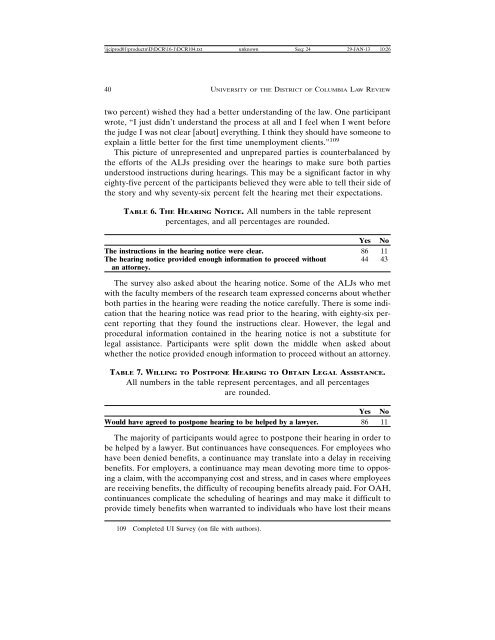volume 16, number 1 - UDC Law Review
volume 16, number 1 - UDC Law Review
volume 16, number 1 - UDC Law Review
- No tags were found...
You also want an ePaper? Increase the reach of your titles
YUMPU automatically turns print PDFs into web optimized ePapers that Google loves.
\\jciprod01\productn\D\DCR\<strong>16</strong>-1\DCR104.txt unknown Seq: 24 29-JAN-13 10:2640 UNIVERSITY OF THE DISTRICT OF COLUMBIA LAW REVIEWtwo percent) wished they had a better understanding of the law. One participantwrote, “I just didn’t understand the process at all and I feel when I went beforethe judge I was not clear [about] everything. I think they should have someone toexplain a little better for the first time unemployment clients.” 109This picture of unrepresented and unprepared parties is counterbalanced bythe efforts of the ALJs presiding over the hearings to make sure both partiesunderstood instructions during hearings. This may be a significant factor in whyeighty-five percent of the participants believed they were able to tell their side ofthe story and why seventy-six percent felt the hearing met their expectations.TABLE 6. THE HEARING NOTICE. All <strong>number</strong>s in the table representpercentages, and all percentages are rounded.Yes NoThe instructions in the hearing notice were clear. 86 11The hearing notice provided enough information to proceed without 44 43an attorney.The survey also asked about the hearing notice. Some of the ALJs who metwith the faculty members of the research team expressed concerns about whetherboth parties in the hearing were reading the notice carefully. There is some indicationthat the hearing notice was read prior to the hearing, with eighty-six percentreporting that they found the instructions clear. However, the legal andprocedural information contained in the hearing notice is not a substitute forlegal assistance. Participants were split down the middle when asked aboutwhether the notice provided enough information to proceed without an attorney.TABLE 7. WILLING TO POSTPONE HEARING TO OBTAIN LEGAL ASSISTANCE.All <strong>number</strong>s in the table represent percentages, and all percentagesare rounded.Yes NoWould have agreed to postpone hearing to be helped by a lawyer. 86 11The majority of participants would agree to postpone their hearing in order tobe helped by a lawyer. But continuances have consequences. For employees whohave been denied benefits, a continuance may translate into a delay in receivingbenefits. For employers, a continuance may mean devoting more time to opposinga claim, with the accompanying cost and stress, and in cases where employeesare receiving benefits, the difficulty of recouping benefits already paid. For OAH,continuances complicate the scheduling of hearings and may make it difficult toprovide timely benefits when warranted to individuals who have lost their means109 Completed UI Survey (on file with authors).














